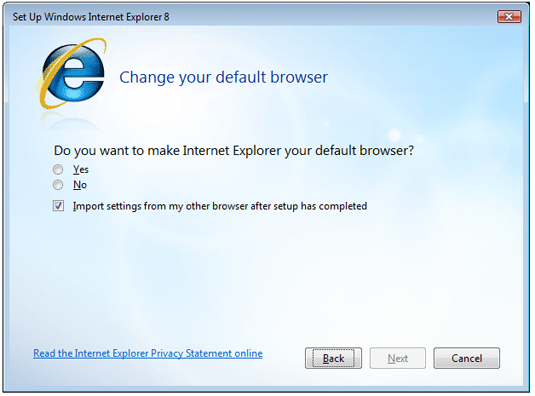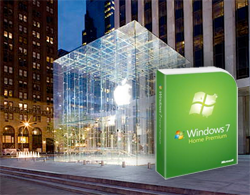Microsoft is saying it’ll roll out an update to Internet Explorer 8 in August with a tweak to the setup routine which I just love. If you have another browser set as the default, you’ll see this dialog when you run IE for the first time:

Not only does it not set IE as the default browser without your permission, but it doesn’t even pre-select IE–an option which is always the one that Microsoft would prefer, but frequently not the one the user in question prefers. You’re forced to click your preferred option; there’s essentially no way to end up with IE as your default browser by accident, and nobody will feel that Microsoft is tugging at his or her sleeve or interfering with the system configuration.
[UPDATE: Clarification based on feedback in comments–what Microsoft is doing is showing you this dialog even if you chose Express Settings, which formerly set IE8 as the default browser.]
(Okay, it’s possible that some people will maintain that Microsoft shouldn’t even ask about default browser settings–but it seems like a reasonable matter to bring up during installation of a new browser.)
I’d like to see every software company with a product that involves operating system default settings take this approach; it should also be required behavior when it comes to depositing icons in the Start menu, the desktop, and the System Tray.
The world of software and the Web is rife with examples of companies erring on the side of serving their own interests rather than helping consumers get what they want. The next time I install IE 8 on a system and see this dialog, it’ll make me feel better about Microsoft’s role as a citizen of the dominion that is my PC. Isn’t it just possible that that’s worth more to the company than any number of PCs having their default browser switched to IE for reasons other than express desire of the computer’s owner?

 When Microsoft opens its retail stores this far, look no further than your local Apple store to find one. The software giant has designs to open many of its store in close proximity to its rival,
When Microsoft opens its retail stores this far, look no further than your local Apple store to find one. The software giant has designs to open many of its store in close proximity to its rival,  Microsoft tricked us by revealing its 3D motion-sensing camera at E3. At the game industry’s biggest trade show, we all assumed Project Natal would be a console peripheral for gaming, but Bill Gates says the camera will have other uses in Windows.
Microsoft tricked us by revealing its 3D motion-sensing camera at E3. At the game industry’s biggest trade show, we all assumed Project Natal would be a console peripheral for gaming, but Bill Gates says the camera will have other uses in Windows. Special all-Office-2010 section:
Special all-Office-2010 section: Today at its
Today at its  Google’s
Google’s  Microsoft is rolling out version 3 of
Microsoft is rolling out version 3 of  Steven Sinofsky, the no-nonsense head of Windows and Windows Live Engineering, has
Steven Sinofsky, the no-nonsense head of Windows and Windows Live Engineering, has